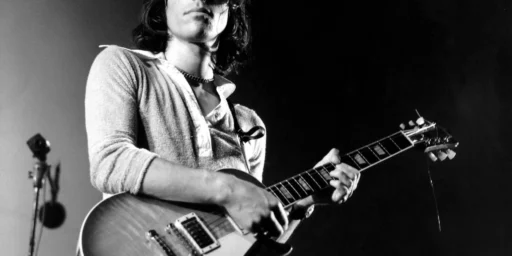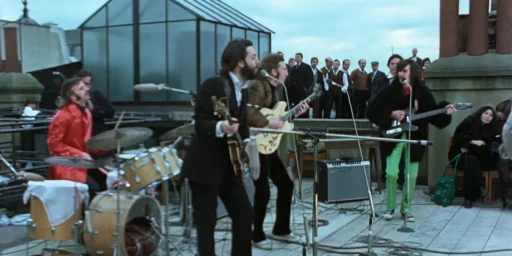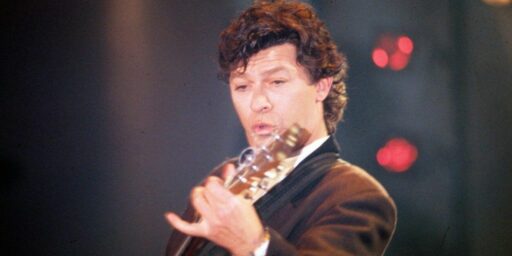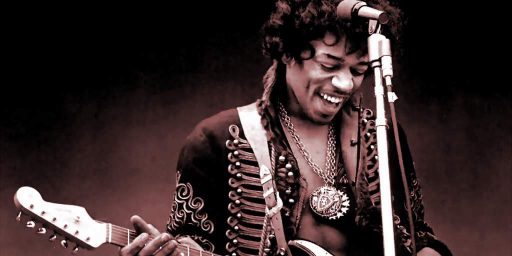Top 50 Conservative Rock Songs
Like “South Park Republicans,” the concept of “conservative rock songs” is rather counterintuitive. Nonethless, the editors of the venerable National Review of compiled a list of the top 50.
The New York Times lists all 50 and provides NR’s reasoning, some of which is rather strained. And a few of the songs are by no means “rock,” even by the expansive new definition that includes Aretha Franklin.
Some examples and analysis below the fold.
1. Won’t Get Fooled Again,” by The Who.
The conservative movement is full of disillusioned revolutionaries; this could be their theme song, an oath that swears off naive idealism once and for all. “There’s nothing in the streets / Looks any different to me / And the slogans are replaced, by—the—bye. . . . Meet the new boss / Same as the old boss.” The instantly recognizable synthesizer intro, Pete Townshend’s ringing guitar, Keith Moon’s pounding drums, and Roger Daltrey’s wailing vocals make this one of the most explosive rock anthems ever recorded — the best number by a big band, and a classic for conservatives.
I’m not sure cynicism and an acknowlegement that Leftist causes eventually become conservative staples is a conservative viewpoint–although it’s generally correct. Surely, this isn’t the best example of a conservative rock song?
2. “Taxman,” by The Beatles.
A George Harrison masterpiece with a famous guitar riff (which was actually played by Paul McCartney): “If you drive a car, I’ll tax the street / If you try to sit, I’ll tax your seat / If you get too cold, I’ll tax the heat / If you take a walk, I’ll tax your feet.” The song closes with a humorous jab at death taxes: “Now my advice for those who die / Declare the pennies on your eyes.”
More populist than conservative. But yes.
3. “Sympathy for the Devil,” by The Rolling Stones.
Don’t be misled by the title; this song is “The Screwtape Letters” of rock. The devil is a tempter who leans hard on moral relativism — he will try to make you think that “every cop is a criminal / And all the sinners saints.” What’s more, he is the sinister inspiration for the cruelties of Bolshevism: “I stuck around St. Petersburg / When I saw it was a time for a change / Killed the czar and his ministers / Anastasia screamed in vain.”
Not sure Jagger and company were going for a conservative theme. Douglas Cruickshank provides an excellent literary take on it for Salon.
4. “Sweet Home Alabama,” by Lynyrd Skynyrd.
A tribute to the region of America that liberals love to loathe, taking a shot at Neil Young’s Canadian arrogance along the way: “A Southern man don’t need him around anyhow.”
Definitely a Southern anthem but not sure there’s much “conservative” about it, aside from vague pro-Wallace sympathies and the line “Now Watergate does not bother me/Does your conscience bother you?”
7. “Revolution,” by The Beatles.
“You say you want a revolution / Well you know / We all want to change the world . . . Don’t you know you can count me out?” What’s more, Communism isn’t even cool: “If you go carrying pictures of Chairman Mao / You ain’t going to make it with anyone anyhow.” (Someone tell the Che Guevara crowd.)
This is a classic case of liberal values become conservative over time. The Lads were pretty liberal even by the standards of 1960s era twentysomethings. They were just also anti-violent and anti-Communist. So, incidentally, was George McGovern.
16. “Get Over It,” by The Eagles.
Against the culture of grievance: “The big, bad world doesn’t owe you a thing.” There’s also this nice line: “I’d like to find your inner child and kick its little ass.”
This one deserved to be much higher on the list. Again, though, Henley and company are hardly conservatives.
20. “Rock the Casbah,” by The Clash.
After 9/11, American radio stations were urged not to play this 1982 song, one of the biggest hits by a seminal punk band, because it was seen as too provocative. Meanwhile, British Forces Broadcasting Service (the radio station for British troops serving in Iraq) has said that this is one of its most requested tunes.
An inspired choice, although a case of a song being seized upon people with radically different sympathies than the songwriter.
31. “Small Town,” by John Mellencamp.
A Burkean rocker: “No, I cannot forget where it is that I come from / I cannot forget the people who love me.”
Mellencamp will cringe if he finds out conservatives are glomming onto his music.
35. “Who’ll Stop the Rain,” by Creedence Clearwater Revival.
Written as an anti—Vietnam War song, this tune nevertheless is pessimistic about activism and takes a dim view of both Communism and liberalism: “Five—year plans and new deals, wrapped in golden chains . . .”
Again, cynicism is not conservatism.
50. “Stand By Your Man,” by Tammy Wynette.
Hillary trashed it — isn’t that enough? If you’re worried that Wynette’s original is too country, then check out the cover version by Motörhead.
Wynette ain’t rock and roll, gents.






Further proof conservatives have no sense of irony.
Most of the songs seem like a stretch. The most solid were the ones I was expecting: just about anything by Rush. They could have taken several anti-communist songs from “Grace Under Pressure” alone.
Also, I agree with Jamie: There is some irony in some of those songs that’s being overlooked.
Guess these boys missed Lennon’s line “If you want money for people with minds that hate, all I can tell you is brother you have to wait”.
Anything by Skrewdriver would’ve been more apt.
I could make a list of reasons why not to bother making lists.
I think you are wasting your time trying to analyze the songs and justify whether they are actually conservative or not. It’s more about how people of a particular point of view adopt songs to suit their view. That’s the beauty of art; it speaks for itself. Sometimes, much to the artists dismay, it conveys a message the artist did not intend.